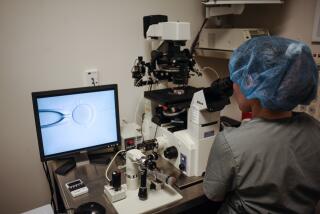Parents of fatally injured West Point cadet can use his frozen sperm for surrogate birth, judge rules
A judge has ruled that the parents of a 21-year-old West Point cadet fatally injured in a skiing accident can use his frozen sperm to produce a child. In handing down the ruling, the New York Supreme Court justice noted potential ethical considerations.
Justice John Colangelo’s ruling, dated Thursday, gives Peter Zhu’s parents the ability to attempt conception with a surrogate mother using their late son’s sperm. The judge said Zhu’s parents had not decided whether they would try to use it.
“At this time, the court will place no restrictions on the use to which Peter’s parents may ultimately put their son’s sperm,” Colangelo wrote, “including its potential use for procreative purposes.”
Zhu, of Concord, Calif., died after a ski accident in February at West Point. His parents received court permission to have his sperm retrieved and frozen at the same time he underwent organ donation surgery, but the judge waited until last week to rule on whether they could attempt reproduction. The sperm is preserved at a sperm bank.
Colangelo said he found no restrictions in state or federal law. He noted that few courts had addressed the issue of posthumous reproduction, but those who have addressed it have used the decedent’s intent as a deciding factor. He cited a 2008 case where a court ordered the destruction of a man’s sperm according to his written request during his lifetime, despite his widow’s claim to the sperm as her property.
He also cited a 1993 case where a court held that a dead man’s estate representative didn’t have the right to destroy his frozen sperm in light of his written intent that it be stored for possible future use by his longtime girlfriend.
Zhu left no written intention regarding the use of his genetic material for procreation after his death, Colangelo said. But he said Zhu’s parents testified regarding conversations where he talked of his dream of having several children and the responsibility he felt to carry on his cultural and family legacy. Zhu’s military advisor at West Point also testified that Zhu had stated, during mentoring sessions, his goal of having several children.
Monica Minzhi Yao, Zhu’s mother, said Monday the family wanted privacy and would not comment on the case. “We are extremely devastated over this freak accident,” she said. “Our pain is something that no words can describe.”
And although Colangelo left the decision of what to do with Zhu’s sperm up to his family, he noted there might be other obstacles, including the reluctance of some doctors to assist for ethical reasons.
Typically, court cases involving posthumous reproduction are filed by surviving spouses, not parents. But Zhu’s case isn’t unprecedented.
In 2007, a court in Iowa authorized recovery of a man’s sperm by his parents to donate to his fiance for future procreative use. In 2009, a Texas woman got a judge’s permission to have her 21-year-old son’s sperm extracted after his death, with the intention of hiring a surrogate mother to bear her a grandchild.
In 2018, the American Society for Reproductive Medicine issued ethical guidelines for fertility centers on posthumous collection of reproductive tissue. The organization said it’s justifiable if authorized in writing by the deceased. Otherwise, it said, programs should only consider requests from the surviving spouse or partner.
PREVIOUSLY: Parents of dead West Point cadet retrieve his sperm »
More to Read
Sign up for Essential California
The most important California stories and recommendations in your inbox every morning.
You may occasionally receive promotional content from the Los Angeles Times.










